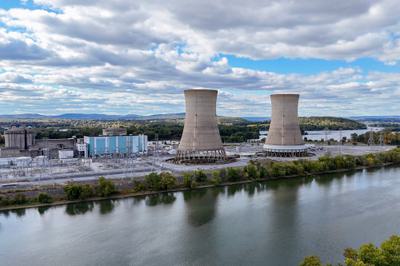
Hannah Ritchie.
Courtesy of Hannah Ritchie
Yale Environment 360: In the past few months, the U.S. has slashed support for renewable energy. How do you think that will impact the global energy transition?
Hannah Ritchie: Obviously at a national level, I think the U.S. transition will slow down. I think people’s assumption would be, of course, that it will also slow down the global transition. I’m not fully convinced of that. I think that often you get a scenario where a large, powerful country like the U.S. leans back, it often creates room for others to lean forward.
I think you’re very much seeing this, even if you just look at China. They’re not just deploying clean energy very quickly domestically. They’re also really dominating global markets and really seeing this as an opportunity. And I think the U.S. pulling back on this is probably giving China even more motivation to move faster.
e360: How is China able to produce so much cheap clean energy?
Ritchie: If you compare the cost of solar or batteries between China and the U.S., people always point to labor costs. They say the only reason China can make cheap batteries is because they have really cheap labor. I think even more important is they’ve heavily invested in automation. The number of workers per [battery produced] is about six times lower than it is in the U.S.
e360: What impact do you think the U.S. putting tariffs on Chinese goods will have?
Ritchie: Often the argument for putting tariffs on is to protect domestic jobs, but it’s only protecting domestic manufacturing jobs. And when you look at jobs in clean energy, a relatively small share come from manufacturing. Most jobs in clean energy are in procurement or development or the installation or repair. They’re in other parts of the supply chain beyond manufacturing.
“I don’t care how many coal plants China builds. I care how much coal China burns. And it is possible to build more coal plants that burn less coal.”
If you put the price up of these technologies, and the deployment slows down, that means that you have fewer jobs in other parts of the clean energy supply chain. If your sole goal is to stimulate manufacturing jobs, then of course you should put a high tariff on. But if you want to optimize clean energy jobs as a whole, tariffs actually work in a negative direction.
e360: U.S. automakers are now backing off from building EVs, and sales are expected to slow. What does that mean for the shift to electric cars?
Ritchie: I think if you look outside of the U.S., EVs are growing pretty quickly. The share of new sales that are electric in the U.S. is far below most of the rest of the world. In Norway, you’re talking about 80-plus percent of new cars being electric. Over half of new sales in China are electric. And that’s a really fast evolution. In 2020 it was around 6 percent.
And I think you’re going to increasingly start to see this in other low- to middle- income countries. For many countries, they will just get cheap EVs or cheap scooters from China, and they will be independent from oil markets.
e360: China is building more clean energy, but it is also building more coal plants. How do you think about that?
Ritchie: The honest answer is I don’t actually care how many coal plants China builds. I care how much coal China burns. And it is possible to build more coal plants that burn less coal and have coal plants that are running less often. And that’s the general trend that we’re starting to see in China.
In the U.S. or in the U.K., we use gas plants to fill in when the sun isn’t shining and the wind isn’t blowing. China is basically trying to do the same, but with coal instead of gas. Which means that it is either retrofitting existing plants to be able to do that — ramping up and down when you need to fill in the gaps — or it is building new plants with that capability.
e360: Is the proliferation of A.I. and the electricity it demands going to be a lifeline for fossil power?
Ritchie: Potentially in the short term. It’s obviously very hard to predict these trends, but when I look at projections, I don’t see it as a dramatically different challenge from any of the other electrification challenges that we have.
If you look at projections of the growth in electricity demand by 2030 [from data centers], it’s actually lower than the increase from air conditioning or EVs or industry. I think in people’s heads they often think about A.I. as much, much bigger than that.
“You’re talking about thousands of deaths over decades [from nuclear accidents], relative to millions of deaths from fossil fuels every single year.”
I think the key challenge is not necessarily about total electricity demand. [A.I.] is moving extremely quickly, and it just takes time to build [new power plants], unfortunately, which means that you just go for what is available, which often is a gas plant that’s not running at full capacity. And the other challenge is that data centers are very highly geographically concentrated, which means that there is a lot of local pressure on the grid.
e360: A lot of tech companies are looking at nuclear plants to power data centers. Do you see risks there?
Ritchie: Burning fossil fuels, through air pollution, kills millions of people every single year. And you compare that to the biggest nuclear disasters we’ve had. No one died in Three Mile Island. No one died directly from Fukushima, even though a tsunami hit the nuclear power plant. And the estimates for Chernobyl vary, but they’re maybe in the low thousands. You’re talking about thousands of deaths over decades, relative to millions of deaths from fossil fuels every single year.
I think for me the safety component is just not an obvious deal breaker. The key challenge is, one, cost and, two, construction time. And I think they’re very much interlinked. Often these very large time overruns inevitably lead to extremely high costs. And the reality is that in a country like the U.S. or many countries across Europe, it now is pretty expensive to build a nuclear plant.

The shuttered Three Mile Island nuclear plant in Middletown, Pennsylvania, will reopen in 2027, generating power for Microsoft data centers.
Heather Khalifa / Bloomberg via Getty Images
e360: In the event that warming does reach unmanageable levels, some scientists say we should be looking into solar geoengineering to cool the planet. Others say that we shouldn’t even be researching the technology because knowing more about it would tempt its use. What’s your view?
Ritchie: I think the challenge is that we currently have insufficient information on the potential impacts of solar geoengineering. I think my main point on this is that I don’t think the odds are that low that over the next 50 years a country, or even a small group of countries, decides on their own that they’re going to do this. They have had a really large heat wave that has killed a lot of people, and they don’t want to see any more warming.
You can do this relatively cheaply. It will be accessible to many countries across the world to do this on their own. And if we are in that scenario, I would really like us to understand what we might be dealing with, what the consequences might be.
e360: There’s a debate among people who work on climate change as to whether we should be thinking about individual action or focusing solely on systemic change. How do you think about that?
“I don’t want people to walk away thinking that [solving climate change is] easy or it’s inevitable. We still have a ton of work to do.”
Ritchie: In general, I think these debates create a false dichotomy. To me, neither extreme makes any sense. I think it’s wrong to say that as individuals we can fix this, and if we all just do our little part, it’ll be solved, because that’s obviously not true. At the same time, I don’t like this narrative that this is purely a systemic problem, and it’s completely on a few companies and governments to solve this.
Take the transition to electric cars. You can say that this is a systemic problem. In order for us to make this transition, governments need to make sure there is a large charging network everywhere. Companies need to make sure that electric cars have a really good range and are affordable for people, and there needs to be finance behind that. And I think they should be doing that. But they’re never going to do that if, as individuals, we vow to never give up a gasoline or petrol car.
So yes, governments and financial institutions and companies need to take action and make this change at a systemic level. But you also need individuals who are willing to play their part, whether that’s in their purchasing decisions, or whether that’s in support of governments that want to take those actions.
e360: Do you consider yourself an optimist on climate?
Ritchie: My work is generally quite positive, and I’m relatively optimistic, and I think some people take that the wrong way. I don’t want people to walk away thinking that [solving climate change is] easy or it’s inevitable. We still have a ton of work to do. I often try to present opportunities or visions of what we can build, but by no means is that transition inevitable. We have to actually work to make it happen.


